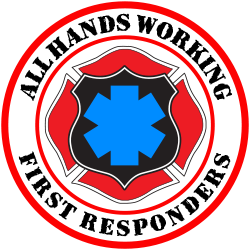All Hands Working exists to reduce the number of line of duty deaths and injuries suffered by our firefighters. The primary focus has been on the overall health of the firefighter and the simple fact that heart attacks represent a disproportionate number of fatalities. Injuries and line of duty deaths can be directly attributable to the level of fitness of the firefighter as well as the level of training, but an argument can be made for a sharp contrast between the technological advances of personal protective gear versus gains made in education. When you are looking at the overall health of the firefighter you must also focus on the mental aspect of the job and the toll it takes on the first responder. Education and training must also focus on the less popular topics and steps need to be taken to educate our firefighters on addiction awareness as well as the danger signs and symptoms of mental health problems. Firefighters are exposed to many things that the average person will never have to experience. Death and dying are a far to common exposure problem for the first responder and we hope that by providing education and awareness we can curb some of the problems that can be encountered by the firefighter. Below are some links and resources in case the need arises to reach out for help.
Help is Here
Online behavioral health resources for emergency responders
suicidepreventionlifeline.org1-800-273-TALK (8255)
Launched in 2005 by the U.S. Substance Abuse and Mental Health Services Administration and the Mental Health Association of New York City, the National Suicide Prevention Lifeline provides free and confidential 24/7 support to people in suicidal crisis or emotional distress. nfpa.org/1500
The document information page for NFPA 1500, Fire Department Occupational Safety and Health Program, includes chapters titled “Behavioral Health and Wellness Programs” and “Occupational Exposure to Atypically Stressful Events.” ffhba.org
This site includes information on the Firefighter Behavioral Health Alliance and on training workshops, a suicide questionnaire, and how to report firefighter and emergency medical service suicides. flsi13.everyonegoeshome.com
The website for the National Fallen Firefighters Foundation “Everyone Goes Home” program offers resources for officer training, peer-support, and behavioral health issues in the fire and EMS services. nvfc.org/help
The National Volunteers Fire Council website offers reports, online training, and other resources for first responders. impact-uw.org
IMPACT is an evidence-based depression care program developed at the University of Washington, including tools, manuals, and videos on depression treatment. csff.org
Counseling Services for Firefighters includes resources for training senior officers and clinicians for working with first responders. firehero.org/resources/families/survivors
The website of the Fire Service Survivor Network includes resources for families and coworkers of firefighters killed in the line of duty. nvfc.org/help
1-888-731-FIRE (3473)
This free, confidential helpline available 24 hours a day, seven days a week to members of the fire, EMS, and rescue services and their families. brattlebororetreat.org/usp
The Uniformed Service Program includes specialized trauma and addiction treatment for law enforcement, fire, military (active and veterans), EMS, and corrections personnel. badgeoflife.com
A website run by the Badge of Life Police Mental Health Foundation and devoted to the psychological health of police officers nationwide.












